- Home
- James Clavell
Gai-Jin Page 2
Gai-Jin Read online
Page 2
A few hours ago the four of them had ridden out of the main gate, past the Customs House, casually saluted the samurai guards who bowed perfunctorily, and trotted leisurely inland along meandering paths, heading for the Tokaidō. All were expert riders, their ponies nimble.
In Angelique’s honor, they wore their best top hats and riding clothes, and were the envy of every man in the Settlement: one hundred and seventeen resident Europeans, diplomats, traders, butchers, shopkeepers, blacksmiths, shipwrights, armorers, adventurers, gamblers and many ne’er-do-wells and remittance men, most of them British, the clerks Eurasian or Chinese, a few Americans, French, Dutch, Germans, Russians, Australians and one Swiss; and amongst them three women, all matrons, two British, wives of traders, the last a madam in Drunk Town, as the low-class quarter was called. No children. Fifty to sixty Chinese servants.
John Canterbury, a good-looking, craggy-faced British trader acted as their guide. The purpose of the excursion was to show Phillip Tyrer the way by land to Kanagawa, where meetings with Japanese officials took place from time to time; it was well within the agreed Settlement area. Tyrer, just twenty-one, had arrived yesterday from London via Peking and Shanghai, a newly appointed student interpreter to the British Legation.
This morning, overhearing the two of them in the Club, Malcolm Struan had said, “May I come along, Mr. Canterbury, Mr. Tyrer? It’s a perfect day for sightseeing; I’d like to ask Miss Richaud to join us—she hasn’t seen any of the country yet.”
“We’d be honored, Mr. Struan.” Canterbury was blessing his luck. “You’re both welcome. The ride’s good though there’s not much to see—for a lady.”
“Eh?” Tyrer had said.
“Kanagawa’s been a busy post village and stopover place for travellers to and from Yedo for centuries, so we’re told. It’s well stocked with Teahouses, that’s what most brothels are called here. Some of them are well worth a visit, though we’re not always welcome like at our own Yoshiwara across the swamp.”
“Whorehouses?” Tyrer had said.
The other two had laughed at his look. “The very same, Mr. Tyrer,” Canterbury had said. “But they’re not like the doss houses or brothels in London, or anywhere else in the world; they’re special. You’ll soon find out, though here the custom is to have your own doxy, if you can afford it.”
“I’ll never be able to do that,” Tyrer said.
Canterbury laughed. “Maybe you will. Thank God the rate of exchange favors us, oh my word! That old Yankee Townsend Harris was a canny bastard.” He beamed at the thought. Harris was the first American Consul-General appointed two years after Commodore Perry had forced the opening of Japan to the outside world, first in ’53, then ’56 with his four Black Ships—the first steamers seen in Japanese waters. Four years ago, after years of negotiating, Harris arranged Treaties later ratified by major Powers that granted access to certain ports. The Treaties also fixed a very favorable rate of exchange between silver Mex—Mexican silver dollars, the universal coin of exchange and trade in Asia—and Japanese gold oban, whereby if you changed Mex for oban and later exchanged them for Mex, you could double or triple your money.
“An early lunch, then off we go,” Canterbury said. “We’ll be back in good time for supper, Mr. Struan.”
“Excellent. Perhaps you’d both join me in our company dining room? I’m giving a small party for Mademoiselle Richaud.”
“Thank you kindly. I trust the tai-pan’s better?”
“Yes, much better, my father’s quite recovered.”
That’s not what we heard in yesterday’s mails, John Canterbury had thought worriedly, for what affected the Noble House—the nickname by which Struan and Company was known the world over—affected them all. Rumor is your old man’s had another stroke. Joss. Never mind, it’s not often a man like me gets the chance to chat to a real tai-pan-to-be, or an angel like her. This’s going to be a great day!
And once en route, he became even more affable. “Oh, Mr. Struan, you … are you staying long?”
“Another week or so, then home to Hong Kong.” Struan was the tallest and strongest of the three. Pale blue eyes, long reddish brown hair tied in a queue, and old for his twenty years. “No reason to stay, we’re in such good hands with Jamie McFay. He’s done a sterling job for us, opening up Japan.”
“He’s a nob, Mr. Struan, and that’s a fact. Best there is. The lady will leave with you?”
“Ah, Miss Richaud. I do believe she’ll return with me—I hope so. Her father asked me to keep an eye on her, though temporarily she’s the French Minister’s ward while she’s here,” he said lightly, pretending not to notice the sudden gleam, or that Tyrer was deep in conversation with Angelique in French, which he himself spoke hesitantly, and already under her spell.
Don’t blame him, Canterbury, or anyone, he thought, amused, then spurred forward to give the others room as the path ahead became a bottleneck.
The terrain was flat but for bamboo thickets, though it was wooded here and there—the trees already autumn-tinged. There were many duck and other game fowl. Paddy fields and rice swamps were being cultivated intensively, and land reclaimed. Narrow pathways. Streams everywhere. The stench of human manure, Japan’s only fertilizer, ever present. Fastidiously, the girl and Tyrer held scented handkerchiefs to their noses, though a cooling breeze came off the sea to take away most of the stink and the dregs of summer’s humidity, mosquitoes, flies and other pests. The far hills, densely forested, were a brocade of reds and golds and browns-beech, scarlet and yellow larch, maples, wild rhododendrons, cedar and pines.
“It’s beautiful there, isn’t it, Monsieur Tyrer? A shame we can’t see Mount Fuji clearer.”
“Oui, demain, il est là! Mais mon Dieu, Mademoiselle, quelle senteur.” What a smell, Tyrer replied happily in fluent French—an essential language for any diplomat.
Casually Canterbury dropped back alongside her, neatly displacing the younger man. “Are you all right, Mademoiselle?”
“Oh, yes, thank you, but it would be good to gallop a little. I’m so happy to be outside the fence.” Since she’d arrived two weeks ago with Malcolm Struan on the bimonthly Struan steamer she had been closely chaperoned.
And quite right too, Canterbury was thinking, with all the riffraff and scum of Yokohama, and let’s be honest, the odd pirate sniffing around. “On the way back you can take a turn around the racetrack if you like.”
“Oh, that would be wonderful, thank you.”
“Your English is just wonderful, Miss Angelique, and your accent delightful. You were in school in England?”
“La, Mr. Canterbury.” She laughed and a wave of heat went through him, the quality of her skin and beauty exhilarating. “I’ve never been to your country. My young brother and I were brought up by my aunt Emma and uncle Michel; she was English, and refused always to learn French. She was more a mother than an aunt.” A shadow crossed her face. “That was after my mother died birthing my brother, and Father left for Asia.”
“Oh, sorry about that.”
“It was a long time ago, Monsieur, and I think of my darling aunt Emma as Mama.” Her pony tugged at her reins. She corrected him without thought. “I was very lucky.”
“This’s your first visit to Asia?” he asked, knowing the answer and much more, wanting to keep her talking. The snippets of information about her, gossip, rumors, had sped from smitten man to smitten man.
“Yes, it is.” Again her smile lit up his being. “My father’s a China trader in your Colony of Hong Kong. I’m visiting him for the season. He’s a friend of Monsieur Seratard here, and kindly arranged this visit for me. You may know him, Guy Richaud, of Richaud Frères?”
“Of course, a fine gentleman,” he answered politely, never having met him, knowing only what others had told him: that Guy Richaud was a philandering, minor foreigner who had been there for a few years, scratching a living. “We’re all honored that you’re visiting us here. Perhaps I may host a dinner in your honor, at
the Club?”
“Thank you. I will ask my host, Monsieur Seratard.” Angelique saw Struan glance back, up ahead, and she waved gaily. “Mr. Struan was kind enough to escort me here.”
“Really?” As if we didn’t know, Canterbury thought, and wondered about her, how you could catch and hold and afford such a treasure, wondered about the brilliant young Struan who could afford it, wondered too about rumors that the struggle for dominance between Struan’s and their major trading rival, Brock and Sons, was rising again, something to do with the American civil war that had started last year.
The pickings are going to be huge, nothing like a war for business, both sides already going at each other like maniacs, the South more than a match for the Union …
“Angelique, look!” Struan reined in, pointing. Ahead a hundred yards, down the small rise, was the main road. They came up beside him.
“I never thought the Tokaidō would be this big, or so crowded,” Phillip Tyrer said.
Except for a few ponies, everyone was on foot. “But … but where are the carriages, or tumbrils or carts? And more than that,” she burst out, “where are the beggars?”
Struan laughed. “That’s easy, Angelique. Like almost everything else here they’re forbidden.” He shifted his top hat to a more jaunty angle. “No wheels of any sort are allowed in Japan. Shōgun’s orders. None!”
“But why?”
“It’s one sure way of keeping the rest of the population in order, isn’t it?”
“Yes, indeed.” Canterbury laughed sardonically, then motioned towards the road. “And add to that, every Tom, Dick or Mary there, high or low, has to carry travel papers, permission to travel, even to be outside their own village, same for princes or paupers. And notice the samurai—they’re the only ones in all Japan who can carry weapons.”
“But without proper stagecoaches and railways, how can the country possibly work?” Tyrer was perplexed.
“It works Japan style,” Canterbury told him. “Never forget Jappers have only one way of doing things. Only one. Their way. Jappers are not like anyone else, certainly not like Chinese, eh, Mr. Struan?”
“Indeed they are not.”
“No wheels anywhere, Miss. So everything, all goods, food, fish, meat, building supplies, every sack of rice, stick of wood, bale of cloth, box of tea, keg of gunpowder—every man, woman or child who can afford it—has to be carried on someone’s back—or go by boat, which means by sea ’cause they’ve no navigable rivers at all, so we’re told, just thousands of streams.”
“But what about the Settlement? Wheels they are allowed there, Mr. Canterbury.”
“Yes, indeed they are, Miss, we’ve all the wheels we want though their officials bitched like bloody … sorry, Miss,” he added quickly, embarrassed. “We’re not used to ladies in Asia. As I was saying, Japper officials, they’re called Bakufu, they’re like our civil service, they argued about it for years until our Minister told them to get f—to, er, to forget it because our Settlement was our Settlement! As to beggars, they’re forbidden too.”
She shook her head and the feather on her hat danced merrily. “It sounds impossible. Paris, she is … Paris is filled with them, everywhere in Europe, it’s impossible to stop the begging. Mon Dieu, Malcolm, what about your Hong Kong?”
“Hong Kong’s the worst,” Malcolm Struan said, smiling.
“But how can they forbid begging and beggars?” Tyrer asked, perplexed. “Mademoiselle Angelique is right, of course. All Europe’s a begging bowl. London’s the richest city in the world, but it’s inundated.”
Canterbury smiled strangely. “There’re no beggars because the Almighty Tycoon, the Shōgun, king of the lot, says no begging, so it’s law. Any samurai can test his blade on any beggar at any time—or on any other bugger … pardon … or anyone else for that matter so long as he’s not samurai. If you’re caught begging you’re breaking the law, so it’s into the slammer, prison, and once there, the only penalty’s death. That’s law also.”
“None other?” the girl said, shocked.
“’Fraid not. So Japanners are untoward law-abiding.” Again Canterbury laughed sardonically and looked back at the twisting road, halting abruptly half a mile away for a wide shallow stream that every person had to ford or be carried over. On the far bank was a barrier. There, they bowed and presented papers to the inevitable samurai guards.
Bloody bastards, he thought, hating them but loving the fortune he was making here—and his lifestyle that centered around Akiko, now his mistress of a year. Ah yes, luv, you’re the best, most special, most loving in all the Yoshiwara.
“Look,” she said. On the Tokaidō they could see groups of passersby had stopped and were pointing in their direction, gaping and talking loudly above the ever present hum of movement—hatred on many faces, and fear.
“Pay no attention to them, Miss, we’re just strange to them, that’s all, they don’t know better. You’re probably the first civilized woman they’ve ever seen.” Canterbury pointed north. “Yedo’s that way, about twenty miles. Of course, it’s off limits.”
“Except for official delegations,” Tyrer said.
“That’s right, with permission, which Sir William hasn’t got once, not since I’ve been here and I was one of the first. Rumor has it that Yedo’s twice as big as London, Miss, that there’s over a million souls there and fantastical rich, and the Shōgun’s castle the biggest in the world.”
“Could that be a lie, Mr. Canterbury?” Tyrer asked.
The trader beamed. “They’re powerful liars, that’s the God’s truth, Mr. Tyrer, the best that have ever been, they make the Chinee seem the Angel Gabriel. I don’t envy you having to interpret what they say, which sure as God made periwinkles won’t be what they mean!” Normally he was not so talkative but he was determined to impress her and Malcolm Struan with his knowledge while he had the opportunity. All this talking had given him a vast thirst. In his side pocket was a thin silver flask but he knew, regretfully, that it would be bad manners to swig some of the whisky in front of her.
“Could we get permission to go there, Malcolm?” she was saying. “To this Yedo?”
“I doubt it. Why not ask Monsieur Seratar’?”
“I shall.” She noticed that he had pronounced the name correctly, dropping the “d” as she had taught him. Good, she thought, her eyes drawn back to the Tokaidō. “Where does she end, the road?”
After a curious pause, Canterbury said, “We don’t know. The whole country’s a mystery and it’s clear the Jappers want to keep it that way and don’t like us, any of us. They call us gai-jin, foreign persons. Another word is I-jin, meaning ‘different person.’ Don’t know the difference ’cepting I’m told gai-jin’s not so polite.” He laughed. “Either way, they don’t like us. And we are different—or they are.” He lit a cheroot. “After all, they kept Japan closed tighter than a gnat’s … closed for nigh on two and a half centuries until Old Mutton Chops Perry bust her open nine years ago,” he said with admiration. “Rumor says the Tokaidō ends in a big city, a kind of sacred city called Keeotoh, where their chief priest—called the Mikado—lives. It’s so special, and sacred, we’re told the city’s off limits to all but a few special Japanners.”
“Diplomats are allowed to travel inland,” Tyrer said sharply. “The Treaty permits it, Mr. Canterbury.”
The trader eased off the beaver topper of which he was inordinately proud, mopped his brow and decided that he would not let the young man spoil his air of bonhomie. Cocky young bastard, with your hoity-toity voice, he thought. I could break you in two and not even fart. “It depends how you interpret the Treaty, and if you want to keep your head on your shoulders. I wouldn’t advise going outside the agreed safe area. That’s a few miles north and south and inland, whatever the Treaty says—not yet, not without a regiment or two.” In spite of his resolve, the swell of the girl’s full breasts under the green form-fitting jacket mesmerized him. “We’re penned in here but it’s not bad. Same at ou
r Settlement at Nagasaki, two hundred leagues westwards.”
“‘Leagues’? I don’t understand,” she said, hiding her amusement and pleasure at the lust surrounding her. “Please?”
Tyrer said importantly, “A league is approximately three miles, Mademoiselle.” He was tall and lithe, not long out of university, and besotted by her blue eyes and Parisian elegance. “You, er, you were saying, Mr. Canterbury?”
The trader tore his attention off her bosom. “Just that it won’t be much better when the other ports are opened. Soon, very soon we’ll have to break out of them too if we’re to really trade, one way or t’other.”
Tyrer glanced at him sharply. “You mean war?”
“Why not? What are fleets for? Armies? It works fine in India, China, everywhere else. We’re the British Empire, the biggest and best that’s ever been on earth. We’re here to trade and meanwhile we can give them proper laws and order and proper civilization.” Canterbury looked back at the road, soured by the animosity there. “Ugly lot, aren’t they, Miss?”
“Mon Dieu, I do wish they wouldn’t stare so.”
“’Fraid you just have to get used to it. It’s the same everywhere. As Mr. Struan says, Hong Kong’s the worst. Even so, Mr. Struan,” he said with sudden esteem, “I don’t mind telling you what we need here is our own island, our own Colony, not a rotten, smelly mile strip of festering coast that’s indefensible, subject to attack and blackmail at any moment if it weren’t for our fleet! We should take an island just like your granddad took Hong Kong, bless him.”
“Perhaps we will,” Malcolm Struan said confidently, warmed by the memory of his famous ancestor, the tai-pan, Dirk Struan, founder of their company and main founder of the Colony twenty-odd years ago in ’41.
Without being aware of what he was doing, Canterbury slipped out his small flask, tipped it back and drank, then wiped his mouth with the back of his hand and slid the flask away. “Let’s go on. Best I lead, single file where necessary, forget the Jappers! Mr. Struan, perhaps you’d ride alongside the young lady, and Mr. Tyrer, you keep the rear.” Very pleased with himself, he spurred his pony into a brisk walk.

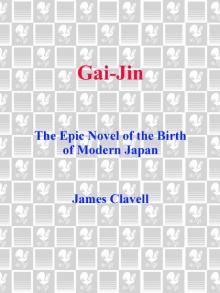 Gai-Jin
Gai-Jin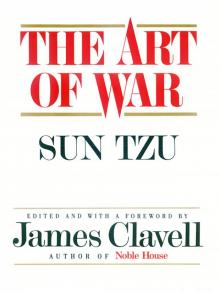 The Art of War
The Art of War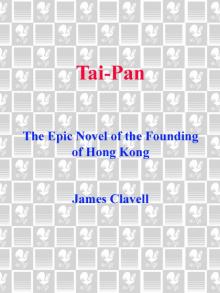 Tai-Pan
Tai-Pan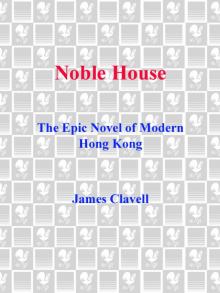 Noble House
Noble House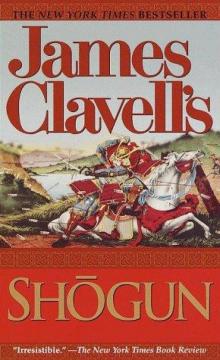 Shōgun
Shōgun Whirlwind
Whirlwind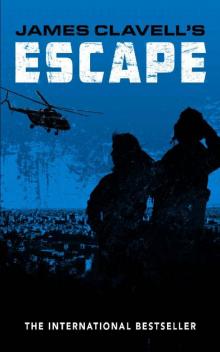 Escape
Escape King Rat
King Rat The Children's Story
The Children's Story